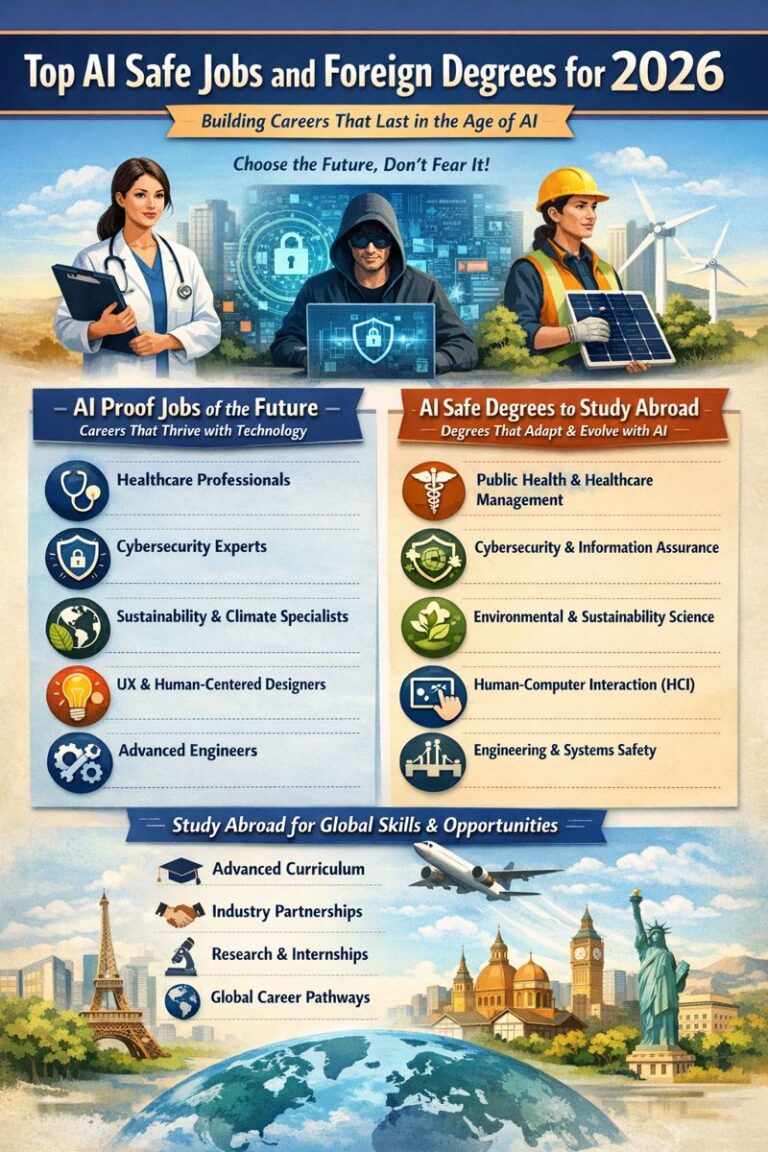Dubai’s higher education sector is growing at a rapid pace.
According to KHDA (Knowledge and Human Development Authority), the government agency that regulates the private higher education sector in Dubai, the 2023-24 academic year saw record-breaking growth.
Here are a few key highlights from their report:
- Student enrolment jumped 12% and reached nearly 35,000 in 2023–24.
- International student numbers rose 25%, making up one‑third of all enrolments.
- Five new global universities opened, diversifying academic offerings.
But it doesn’t end there.
The KHDA also revealed that student numbers are expected to double by 2040. To attract students from all over the world, the city plans to host up to 15 more international university campuses in the coming years.
In fact, interest from global universities is already on the rise. In 2024 alone, over 70 different universities and educational institutions showed formal interest in opening new campuses in Dubai.
So, what does this mean for international students, mainly Indian students, who want to do a master’s in Dubai?
It means more choices and more affordable options. Students will also have greater access to globally recognized degrees.
That’s exactly why you shouldn’t choose a university based on brand name alone. You need to match your investment—in money, effort, and time—to the real outcomes a program can offer.
GradRight’s university search platform helps you do just that. It compares universities based on ROI, post-study work rights, placement records, and salary outcomes—not just rankings. So you can find a program in Dubai that actually pays you back.
If you are dreaming of doing your higher studies in a vibrant and fast-growing academic hub, Dubai is where you can make it a reality.
Why Dubai is emerging as a global education hub
Dubai’s education sector isn’t just growing. It’s planning for the future. With enthusiastic backing from the government, the city is actively shaping a higher education ecosystem that can scale fast.
In 2023, the UAE hosted over 237,000 international students. India topped the list as the largest sender of international students in the city.
The majority of students doing master’s in Dubai enrol in one of the 57 international institutions already operating in the city.
Most of these universities and institutions are in the “freezones” like Dubai International Academic City (DIAC) or Knowledge Village.
These freezones remove many of the typical barriers to entry. They also offer shared infrastructure, state-of-the-art labs, and campus-ready facilities. All this allows international universities to set up campuses and grow without a massive upfront investment.
DIAC is the perfect example of this, and it makes it possible for international students to get a career boost with a master’s in Dubai. Since 2007, it has grown into the largest higher education hub in the Middle East and North Africa (MENA) region. Currently, it hosts 27 universities and more than 27,500 students from 150 countries.
All this progress feeds directly into the Education 33 (E33) strategy that was announced in November 2024. E33 aims to increase the international student population by 50% and achieve 10X growth in education tourism by 2033.
For Indian students looking to pursue a master’s in Dubai, these are more than just impressive statistics.
These indicate that the city can offer global credentials at far lower costs and with more convenience than study abroad destinations in the West.
Top universities offering Master’s programs in Dubai
To get the best career boost with a master’s in Dubai, choosing the right university is crucial. With so many options available, the university selection process can feel overwhelming.
To make a well-informed decision, you need to weigh tuition costs, accreditation, and global recognition. You should also choose programs that are perfectly aligned with your career aspirations.
Ideally, you need to choose a university that can help you with internships and industry networks. There should also be ample financing and scholarship options.
If you want to get a master’s degree from an international university, choosing their Dubai campus will help you get a globally recognized degree at a much lower cost.
Here’s a list of the top universities that are great choices for a master’s in Dubai:
| University Name | Notable Programs | Estimated Tuition Fees (per year) | Key Highlights |
| Middlesex University Dubai |
|
AED 60,000 to 75,000 |
|
| University of Wollongong in Dubai |
|
AED 50,000 to 70,000 |
|
| University of Bradford Dubai |
|
AED 50,000 to 65,000 |
|
| University of Strathclyde Business School Dubai |
|
AED 60,000 to 75,000 |
|
| University of Manchester Middle East Centre |
|
AED 60,000 to 85,000 |
|
| Heriot-Watt University Dubai |
|
AED 50,000 to 75,000 |
|
| The British University in Dubai |
|
AED 50,000 to 65,000 |
|
| Zayed University |
|
AED 45,000 to 60,000 | UAE government-backed university with strong community and industry integration |
| Amity University Dubai |
|
AED 40,000 to 55,000 | A high-ranking Indian university with strong connections in India and globally |
| SP Jain School of Global Management |
|
AED 75,000 to 90,000 |
|
Most in-demand master’s degrees for career growth
For career growth with a Dubai master’s, choosing the right program is essential. Career prospects are the biggest factor you should consider when choosing a master’s program.
Dubai’s job market is reshaping around technology and innovation. Experts think that data science and AI specialist positions are going to be in huge demand in the coming years.
In fact, if you look at GulfTalent, a MENA recruitment portal, you’ll find that there are 2030 data science jobs currently listed. That shows a strong market need.
If you want to go by the most popular programs for master’s and graduate Studies in Dubai, business degrees are the way to go, as per a KHDA report.
Taking career and income prospects into account, here are the most recommended programs for a master’s in Dubai:
| Program | Top Universities in Dubai | Career Paths & Jobs |
| Data Science & AI |
|
|
| Cybersecurity |
|
|
| Renewable Energy Engineering |
|
|
| Financial Technology (FinTech) |
|
|
| Healthcare Informatics |
|
|
| Business Analytics |
|
|
| Construction & Project Management |
|
|
| Digital Marketing & E‑Commerce |
|
|
| Smart City Planning & Urban Design |
|
|
| Supply Chain & Logistics Management |
|
|
Career opportunities after a Master’s in Dubai
We have already pointed out how machine learning and data science roles are on the rise. And it’s not just in Dubai or the UAE. According to a recent World Economic Forum report, this trend is seen all over the world.
The report predicts a 40% jump in the demand for AI and machine learning experts by 2027. Furthermore, data analyst and information security analyst roles have a predicted growth of 30% to 35% by the same time.
This aligns perfectly with UAE Vision 2031. This national plan, which outlines the UAE’s development path for the next decade, prioritizes renewable energy, FinTech, and digital economy as one of the top drivers of growth.
These roles also come with great salary prospects. Mid-level AI professionals, such as AI product managers and machine learning engineers, make around AED 420,000 to AED 660,000 per year.
The average salary of a cybersecurity engineer in the UAE is around AED 375,549.
Getting a postgraduate degree in Dubai can also help you land a job in Dubai Internet City, Healthcare City, and DIFC. Many of the global tech giants, financial institutions, and health-tech firms have offices here.
UAE-based job portals also list thousands of open positions for AI developers, cybersecurity analysts, data scientists, and green-energy engineers, among many others.
This bodes well for Indian students who want a career acceleration in Dubai. With a relevant master’s degree, they can get a job in any of these high-demand fields.
Networking and industry connections: a gateway to global opportunities
Dubai’s master’s programs go beyond the classroom. All the major universities here offer students direct access to their respective industries.
Most of the professional master’s in Dubai come with internships, capstone projects, and employer-driven coursework. And these aren’t merely optional extras. They are built into the program structure to ensure students are career-ready from day one.
Various universities require students to complete internships or industry-linked projects to graduate. The University of Dubai uses internships to combine academic knowledge with real-life practice.
The Emirates Aviation University offers an exclusive one-semester internship with the Emirates Group. With this, students can earn up to 15 credit hours. Similarly, Amity University Dubai requires students to complete a two-month internship.
Then there are various global events happening throughout the year that offer excellent networking opportunities. Take GITEX, for instance. It is the world’s largest tech and startup showcase. Hosted every year, GITEX attracts innovators from around the world.
Scholarships, financial aid, and the cost of studying in Dubai
Financial planning is a huge part of the process. If you are planning to pursue a master’s in Dubai, you need to consider a lot more than just yearly tuition costs.
On average, master’s students may have to pay around AED 55,000 to AED 110,000 per year in tuition alone. You need to add living expenses to that as well. So, considering accommodation, food, transportation, and personal expenses, you can add another AED 3,500 to AED 7,000 per month to the overall cost.
For the majority of Indian students, especially those from modest backgrounds, getting a master’s in Dubai may simply be too expensive. For them, the natural solution is scholarships and financial aid.
Besides university scholarships, make sure to also look into funding offered by governments and private organizations. Here’s a list of the top scholarships and financial aid for Indian students who want to pursue a master’s in Dubai:
| Scholarship Name | Offered By | Coverage |
| Mohammed bin Rashid Al Maktoum Foundation Scholarship | UAE Government/Foundation | Full tuition
Monthly stipend Health insurance Travel costs |
| Outstanding Academic Excellence Scholarships | University of Wollongong Dubai | 10% to 40% tuition fee waiver |
| Khalifa University Postgraduate Scholarships | Khalifa University | Full tuition
AED 4,000 stipend |
| BITS Pilani Dubai Scholarships | BITS Pilani Dubai Campus | 10% to 70% tuition fee waiver |
Besides these, you should also check in with your chosen university. Enquire about any possible financial aid offered by the institute.
Work visa and residency pathways for master’s graduates
Getting a job in Dubai after your master’s can be the ultimate career accelerator. The good news is that there are several post-study visa options for master’s graduates.
The most popular options are the Golden Visa, Green Visa, Standard Employment Visa, and Freelance Visa. Each of the visa options caters to different career options.
Golden Visa:
This is a 10-year renewable residency visa for exceptional talent. Top graduates, entrepreneurs, and investors can also apply for this visa. It does not require a local sponsor. Visa holders can sponsor family members and domestic workers.
Green Visa:
This is a 5-year residency visa for skilled workers. Freelancers and investors are also eligible. Applicants must have a valid employment contract and a minimum monthly salary of AED 15,000. Self-employed individuals have to provide proof of income.
Standard Employment Visa:
This is the most common visa type. It is usually sponsored by UAE-based employers. It is valid for 1 to 3 years but can be renewed.
Freelance Visa
With this visa, you can work independently in permitted sectors like tech, media, and education. The best part about this visa is that it is flexible and self-sponsored.
The simplest way to secure residency after completing a master’s in Dubai would be to get a job with a UAE-based company. However, if you have other career aspirations, make sure to find the appropriate visa options for that.
Frequently asked questions
1. What are the top career-oriented master’s programs in Dubai?
For those looking to get into career-oriented master’s programs, Dubai universities have several options. An MBA is the most sought-after program. However, master’s programs in AI and data science, cybersecurity, engineering and renewable energy, and finance and FinTech are gaining popularity.
2. How does a master’s degree from Dubai enhance job prospects?
You can significantly accelerate your career with a Dubai master’s. The top universities in Dubai offer access to a network of global professionals. They also have great internship and placement programs for master’s graduates.
3. What is the average salary for master’s graduates in Dubai?
Getting a master’s in Dubai can open up several high-paying career pathways. With a master’s degree, you can make around AED 12,000 per month, which roughly translates to nearly INR 3 lakhs per month. However, salary varies based on industry and experience.
4. Are there scholarships available for international students?
Yes, there are several scholarships and financial aid available for international students. The Mohammed bin Rashid Al Maktoum Foundation Scholarship and Khalifa University Scholarships are the most notable.
5. Can I stay and work in Dubai after completing my master’s?
Yes, there are several post-study visa options available. These allow you to stay and work in Dubai after completing your master’s.


















